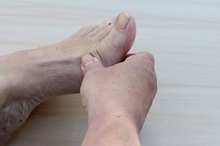The Medical Conditions That Cause Weakness on the Left Side of the Body
The presence of one-sided weakness, a condition known as hemiparesis, often raises the suspicion of a stroke, a neurological condition caused by an interruption in the blood supply to the brain. Brain cells deprived of oxygen die, often causing the classic symptom of one-sided numbness or weakness. Because stroke is the third leading cause of death in the United States, according to the American Heart Association, the presence of weakness on the left side of the body can be disturbing 1. There are other conditions, however, that can cause one-sided weakness.
Transient Ischemic Attack
A transient ischemic attack, often called a mini-stroke, produces symptoms similar to a stroke but without any permanent damage. A transient ischemic attack often warns of a future stroke. The National Institute of Neurologic Disorders and Stroke reports that approximately one-third of those who experience a transient ischemic attack suffer from an acute stroke in the future 2. A transient ischemic attack occurs when the blood supply to the brain is briefly interrupted, which results in numbness and weakness in the face, and depending upon the area of the brain affected, on the left side of the body. The symptoms usually resolve with an hour, according to the National Institute of Neurologic Diseases and Stroke 2.
- A transient ischemic attack, often called a mini-stroke, produces symptoms similar to a stroke but without any permanent damage.
Hemiplegic Migraine
Causes of Temporary Leg Paralysis
Learn More
A specific type of migraine, known as a hemiplegic migraine, can mimic the symptoms of a stroke. In addition, a hemiplegic migraine often causes hemiparesis, the feeling of numbness or weakness on one side of the body.
Multiple Sclerosis
Multiple sclerosis, a chronic and often disabling disease, occurs when the immune system attacks the myelin, the fatty substance that surrounds and protects the nerves. Damage to the myelin can lead to damage to the nerves and the formation of scar tissue. The scar tissue interferes with nerve impulses traveling to and from the brain, resulting in a variety of symptoms. Not all multiple sclerosis patients experience the same symptoms. The most common symptoms include fatigue, dizziness and pain along with numbness, tingling, and weakness that often affects one side of the body. The occurrence of symptoms on one side of the body, sometimes the left side, resembles the symptoms of a stroke.
- Multiple sclerosis, a chronic and often disabling disease, occurs when the immune system attacks the myelin, the fatty substance that surrounds and protects the nerves.
Related Articles
References
- American Heart Association: Stroke Statistics
- National Multiple Sclerosis Society: What Is Multiple Sclerosis?
- Clinical Practice. Cryptogenic Stroke, Saver JL, N Engl J Med. 2016 May 26;374(21):2065-74
- Cryptogenic Stroke: Research and Practice, Yaghi S, Bernstein RA, Passman R, Okin PM, Furie KL, Circ Res. 2017 Feb 3;120(3):527-540. doi:10.1161/CIRCRESAHA.116.308447
Writer Bio
Stephanie Chandler is a freelance writer whose master's degree in biomedical science and over 15 years experience in the scientific and pharmaceutical professions provide her with the knowledge to contribute to health topics. Chandler has been writing for corporations and small businesses since 1991. In addition to writing scientific papers and procedures, her articles are published on Overstock.com and other websites.









